Bozo
Storage? I am Storage!
We have over 15" of snow here in central Pa. The forecast is calling for another 12" to 15". Yuck!
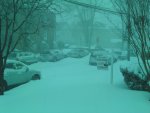
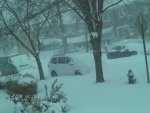
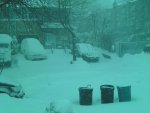
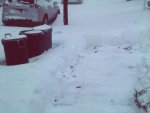
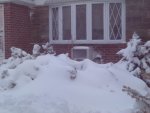
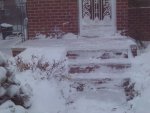
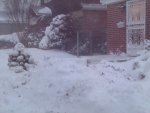
Actually since we already have a gas line going into the kitchen for the gas stove I would imagine that heater could run on natural gas. Thankfully we don't lose power often enough for it to be a huge deal. Last time we had an extended power outage was when Sandy hit. Last year one of the power lines went, and we lost power for a few hours. It was summer, so the problem was more keeping cool than warm. Long term I'm planning to go solar with battery backup which should pretty much make power outages moot.
Just shoveled another 7 inches but it's finally tapering off. Looks like we got maybe 21 or 22 inches total so far. Some parts of the city are reporting over 2 feet.
The past few months, the weather has been bizarre. Flooding in a few parts of the world, drought elsewhere, etc. Hope it's not going to become the new norm.
The last several years have been out of line with historical norms, not planning for this or something similar to be the new normal strikes me as slightly myopic.
At least they seem to have some decent skills. Still a stupid thing to do, but it would be even more stupid if a novice did it.There is no stopping stupidity.
Actually we still have oil heat but the same idea would apply. We would need to run the blower and the water pumps for the hot water heating. Probably a few hundred watts give or take.There are no conversion parts to run Buddy heaters on natural gas. But if you go for solar+batteries you could wire up your natural gas furnace to run the blower/ignitor off battery power, prob around 4-500W or so for a 1/2 HP blower.
I'm thinking of that if it turns out power outages become a lot more frequent. I did the math for running a few space heaters off batteries but I would end up needing something with the capacity of an EV battery. If Con Ed gets their head out of their behind, and puts the power lines underground like they already are in much of the city, I wouldn't be concerned with outages at all. Nobody bothers trimming trees here. Whenever there's high winds I worry we'll lose power.Or get a whole house natural gas genny, though to get long life you need to spend money on a water cooled unit that runs at 1800 rpm versus an air cooled 3600 rpm model.
My opinion as well, which is one of the reasons I'm planning on installing solar power. With a system roughly the size you plan to install, I could run heating or cooling while the sun is out, and have enough battery capacity to at least run lights and some electronics at night.The last several years have been out of line with historical norms, not planning for this or something similar to be the new normal strikes me as slightly myopic.
The problem is where to go. I've read in several places often the best survival strategy is making sure you have enough food/water for at least several weeks, and hunkering down where you live. I couldn't imagine trying to get out of town dragging my mom and the 3 cats along on public transit. Driving wouldn't be any better if either of us drove given that the roads would be parking lots.The best planning is to have good insurance and a method of getting out of town, but I'm no survivalist.
I think it is a case of misplaced incentives. Those in charge are punish7ed if th7ey underestimate th7e storm, but not if th7ey overestimate it.
My opinion as well, which is one of the reasons I'm planning on installing solar power. With a system roughly the size you plan to install, I could run heating or cooling while the sun is out, and have enough battery capacity to at least run lights and some electronics at night.
It seems the regulations in NYC aren't that onerous.
It sounds like you have more restrictions than we do. For what it's worth, NYC is also a free-for-all. I have little doubt as the economics make it viable we'll have all sorts of DIY systems here which they'll be powerless to do anything about. It's worth noting the grid here is actually straining for capacity here, plus adding generating stations is costly (and often not possible at all because of NIMBYism). The utilities for the most part actually want people to add solar to take some of the peak load off them.
Another thought occurred to me. Nowadays many electronic devices, indeed probably just about all of them, using a switching power supply. The 120VAC comes in, gets rectified, then gets chopped and sent to a transformer to get stepped down to lower voltage DC. These devices will happily work off 120VDC in most cases. So will anything which is purely resistive, like a space heater or toaster. I'm wondering if I could just ditch an inverter altogether and send 120VDC from a solar-charged battery right to my wall sockets. Probably most of what I have will work just fine. That could be a viable scenario if I want to disconnect from the grid entirely but want to avoid the expense and efficiency hit of an inverter.
dd please fix/replace your keyboard. My eyes kept crossing while trying to read the message. It was painful.
Apologies. I'll be tearing down my current keyboard and cleaning it tomorrow as a replacement arrives. For now I'll avoid words containing "h7".
It sounds like you have more restrictions than we do. For what it's worth, NYC is also a free-for-all. I have little doubt as the economics make it viable we'll have all sorts of DIY systems here which they'll be powerless to do anything about. It's worth noting the grid here is actually straining for capacity here, plus adding generating stations is costly (and often not possible at all because of NIMBYism). The utilities for the most part actually want people to add solar to take some of the peak load off them.
Another thought occurred to me. Nowadays many electronic devices, indeed probably just about all of them, using a switching power supply. The 120VAC comes in, gets rectified, then gets chopped and sent to a transformer to get stepped down to lower voltage DC. These devices will happily work off 120VDC in most cases. So will anything which is purely resistive, like a space heater or toaster. I'm wondering if I could just ditch an inverter altogether and send 120VDC from a solar-charged battery right to my wall sockets. Probably most of what I have will work just fine. That could be a viable scenario if I want to disconnect from the grid entirely but want to avoid the expense and efficiency hit of an inverter.
Paperwork with the power company was by far the limiting factor. Mainly that they didn't want me producing more than a tiny percentage of what I could receive. Solar City managed to put together an argument based on sub-optimal angles of the panels and weather conditions in my area to allow for more panels than the stated rating would have otherwise allowed. I also had them install a fancier cut-over switch that will allow me to run on local power once I get batteries installed.
First I'm hearing about this. Any more info?Interesting that devices that expect 120VAC will run just fine with 120VDC. Surely someone on the internet has tested this and/or has a list of devices that work fine.
Solar panel efficiency drops considerably when there is more than 0.1" of snow on them. Enough battery capacity to keep space heaters running for a couple days would be insane. Running combustion-based heaters in a living space also isn't recommended. Might I suggest a generator in the basement/garage (someplace ventilated) powering electric heaters in the house? More expensive and less efficient, but way less likely to cause brain damage.
This is based on my knowledge of electronics but I googled it, and it turns out I'm not the first one to think of this. Basically, if it doesn't have an induction motor or a 60Hz transformer it'll probably work just as well on 120VDC as on 120VAC. I was concerned about my fluorescent lights, but almost 100% of them use electronic ballasts. These rectify and filter the incoming 120VAC to ~165VDC, then chop that into a high-frequency wave which is sent to a small transformer which in turn powers the fluorescent tubes. I've noted most of these ballasts (and also most electronic switching power supplies) are specified to work down to at least 85 VAC. 85 VAC rectified and filtered is about 120VDC. In a nutshell, it seems just about everything then will work fine, except those appliances having an induction motor, or power supplies using a 60 Hz transformer. The most modern refrigerators, ACs, and other things with motors tend to use 3-phase motors where the power fed to them is electronically generated from a DC supply. This means those would work just fine on 120VDC. From an electronics standpoint, the nice thing about 120VDC is you don't get an 60Hz hum when you're working on sensitive circuits.First I'm hearing about this. Any more info?
That would be more a case where they would rigorously enforce existing laws rather than pass new ones. Plenty of people do their own wiring or plumbing, even in places which tell you this work must be done by a licensed person. If you're competent it's generally not a problem. I suspect most people who attempt a DIY solar system will be fairly competent. They have to be or it wouldn't work at all.I hope you are right about DIY systems in the future. But you know some hillbilly will fry their kid with some home grown solar setup and "Oh my gawd, think of the children" syndrome will begin with the associated laws, regulations, permitting nightmares, etc, etc.
If the power companies were smart they would invest in making and selling solar panels and batteries since it's almost inevitable their core business will decline somewhat. On another note though this might not be all than onerous. Once a neighborhood goes 100% solar and off-grid, the power company no longer has to build or maintain lines there. The problem exists in between what we have now versus everyone off the grid. As more people, but not everyone, goes off grid, the cost per user of maintaining the grid goes up. That means electric companies must raise their rates, which in turn drives more people off grid. That's a classic death spiral. It's probably almost inevitable that power companies will no longer be profitable just generating and distributing electricity. However, solar panels and batteries both wear out. That points to an ongoing market with great potential. It's also worth noting that the US is becoming more urban. While it's feasible for people in cities living in private homes to go off-grid, it's not possible for apartment dwellers to do the same. Maybe you can generate enough power to cover your needs with solar if you have a 3 or 4 story apartment building. Forget it if you have a 50-story building. You can cover part of your needs with panels on the roof and walls, but not 100%. That gives the power companies a long-term captive market, albeit one which is somewhat smaller than the existing market. Then again, their costs would go way down. They don't have to have miles of power lines in rural or suburban areas which are costly to maintain and serve relatively few people. In fact, I've heard in rural areas especially power companies actually lose money but they legally must provide service to everyone.And yes the power companies want to reduce demand just a bit so they don't have to build new power plants and milk what they currently have. But they are also terrified because with better battery technology they are going to see their revenue (in the future, 20-40 years) take a huge drop.
The grid is strained everywhere, but mostly in the NE like you mentioned. I seem to remember seeing power grid numbers being like 92-99% of current peak capacity. Meaning it won't take much to cause a major disruption.
I'm talking here about putting in a DIY system where I don't get the city or contractors involved at all. There is no inspection. When the house is sold, I would just reconnect the main breaker box. That said, I feel the concept of converting at least some of the outlets in a house to 120VDC might gain traction. Remember I could select which circuits to make DC, and which to leave AC. Most of my air conditioners are on their own breaker. I would leave those alone. And if this idea sees the light of day, there would undoubtedly be standardized 120VDC outlets so you couldn't accidentally plug an AC device into a DC outlet.Interesting that devices that expect 120VAC will run just fine with 120VDC. Surely someone on the internet has tested this and/or has a list of devices that work fine. I would guess that batteries and the installation* charge would be the biggest cost of a system, followed by the panels then the switches and inverter. No way would running 120 VDC thru your house would pass city/county inspection?
*I have no doubt you could install your own solar system jtr, and maybe NYC is different, but some regulations insist that you have a licensed, state, and power company approved company install your system. I remember reading on another forum of an electrician in CA with 29 years of experience and a PhD to boot who wasn't allowed to install his own system.
Remember this only applies if you want to remain connected to the grid. You can install panels and batteries, disconnect from the grid, and give the power company the proverbial middle finger. This is something I'd love to do in time given that Con Ed is talking about $1 and up per kW-hr rates in the not too distant future (right now it's about 30 cents between the supply and delivery charges).The initial reaction of anybody reading what you wrote dd would probably be, "WHAT THE F*CK right does the power company have any F*CKING SAY as to what I put on my F*CKING roof." But of course, your solar panels "touch" the god-all-mighty grid, so F-YOU citizen, you will have a power/utility bill whether you like it or not.
I doubt it. They can't force you to remain connected to the grid the same way the government can't force citizens to buy anything else. At least in the US, that wouldn't pass constitutional muster. Note that we may have mandatory auto insurance, but you only have to pay it if you own a car. Technically even though the ACA says you have to buy health insurance just by virtue of being alive, you get subsidies if you can't afford it, you get waivers if you don't qualify for subsidies and the cheapest insurance is too costly, or you can pay penalties if neither of those apply. I might imagine something similar might apply here. At worst (and I'm doubtful even this would pass constitutional muster) you might have to pay the power companies a penalty amounting to a fraction of a typical electric bill for not being connected to the grid. This might be perhaps $25 a month. They can't force you to connect to the grid and buy electricity. What happens if you just refuse to pay the bill? What happens now? Their only remedy is to just turn off the power, which ironically is exactly what you would want anyway. I liken the situation to that with electric cars. When most of the fleet goes EV, what will the gas companies do, force the American public to buy gas and gas cars? Make EVs illegal? All these things amount to protectionism from obsolescence. They have no place in a free market./tinfoilhat ON
In 5-30 years laws are going to be passed that if you house CAN be hooked up to the grid, it MUST, be hooked up to the grid. With a smart meter that will disconnect power if you use too much power, too little power, watch the "wrong" TV channel, don't vote "correctly," download too much pRon, buy a gun, late paying a bill, any bill, etc, etc.
Carrington Event.
/tinfoilhat OFF
Other than being in a place where you're car dependent, what you're aiming for isn't that far from what I'm aiming for. Probably no sense digging a well here or using a septic tank given that the city water and sewer system is still reasonably cost effective but I'd like to be independent of the grid for power, and possibly for connectivity. I'd like to also grow as much of my own food as possible. That's not as far fetched as it sounds, even with the small amount of land we have. We would probably have to devote every square foot of outside space, including the driveway, to growing stuff to make that remotely possible, but being at least semi-independent of the outside world for food is a goal I'd strive for.I think this is just about as far from what JTR wants as possible.
